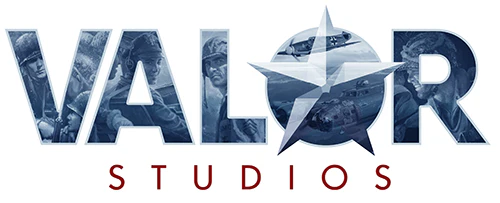-
Throughout history it was a storied region with fairytale charm and 350 miles of pristine coastline and beaches dotted with quaint medieval villages. But as of June 6, 1944, the French province of Normandy had become ground zero for the Allies “second front.” With the start of Operation Overlord on D-Day, nearly 160,000 allied troops stormed into Normandy and villages and towns that were previously little-known to foreigners became household names such as Sainte-Mère-Église, Carentan, and Caen.
Our latest “Sites of Valor” sign pays tribute to the Allied soldiers who heroically fought through the villages and hedgerows of Normandy. Featuring hand-embellished weathering, each aluminum sign looks like it was pulled from a battle-ravaged seaside town that once welcomed tourists. And, most notably, each bears the signatures of Omaha Beach survivors Maj. Gen. John Raaen Jr. and MSgt. Charles Shay, who autographed the signs in Normandy!
Whether you display your sign under your favorite D-Day print, or as a backdrop for models, these are destined to become the ultimate item in any "Man Cave." With a limited number worldwide, place your order now before they're history.
Shipping added in checkout // size: 19.75" x 7" // ships sleeved & boxed
LESS THAN HALF REMAIN!
-
MAIN EDITION - Less than half remain!
300 limited-edition signs, numbered on the reverse side, signed in black fade-resistant marker by two veterans who landed in Normandy on D-Day:
Omaha Beach survivors Maj. Gen. John Raaen, Jr. (5th Ranger Bn) and MSgt. Charles Shay (F-Co, 16th Inf, 1st ID).
Each sign includes a seal of authenticity on the reverse side. Extra items shown in display images not included.
OTHER EDITIONS
An Open Edition, bearing no autographs may be released by Valor Studios. A Signer Proof edition of 10 signs exists for project helpers.
-
MAJOR GENERAL JOHN RAAEN
Born the son of an officer on an army base in Georgia, John Raaen had the military in his blood, attending West Point before progressing first to the Engineer Corps and then the newly created 5th Ranger Battalion in 1943.
Supposed to follow on behind the 2nd Rangers tasked with attacking the Pointe du Hoc, delays and miscommunication meant Captain Raaen and members of the 2nd and 5th Ranger Battalion were sent into Omaha beach instead. Arriving at a slightly less well-defended section of the beach, Raaen and his Rangers were able to break through the German lines, challenging machine gun nests, and helping to slow down the slaughter on the beach below.
On D+1 Raaen began making his way to the Pointe du Hoc where he eventually helped to relieve the troops whom had been held there by German gunfire since the early hours of D-Day. For his first three days service in Normandy, Raeen was awarded the Silver Star.
After the war he went on to rise through the ranks to Major General before retiring in 1979 after 36 years of service.
MASTER SERGEANT CHARLES SHAY
A member of the Penobscot Indian Nation, Charles grew up on their tribal reservation on Indian Island in Maine. In April 1943, he was drafted into the Army and became a 19-year-old platoon medic in F-Company, 16th Infantry Regiment, 1st Infantry Division, the famed battle hardened “Big Red One”.
On D-Day, Charles was in the first assault wave on Omaha Beach and spent the morning doing whatever he could to ease the suffering of the men around him. As the tide moved in, Charles pulled numerous wounded men to safety, thus saving many lives. He was awarded the Silver Star for his bravery that day.
In battles to follow, Charles would save American lives at Aachen, the Hurtgen Forest, in the Ardennes, and across the Rhine. He was captured when he accompanied a recon patrol that was overwhelmed by German, though he was liberated not long after on April 18, 1945.
After VE-Day, Charles reenlisted in the Army and was stationed in Europe. During the Korean War, he joined the 7th Infantry Regiment, 3rd Infantry Division, as they fought the Chinese in North Korea. There, Charles earned the Bronze Star with two oak leaf clusters, and a Silver Star nomination.
Upon returning home, he switched services and became a member of the Air Force’s 6th Weather Squadron. In 1964, Charles retired a Master Sergeant, after twenty years of service, and joined the International Atomic Energy Agency, a role he would stay in until age 60.
Today, Charles is a tribal elder and remains active in promoting the history of Native Americans who fought in the armed forces. He is a frequent guest at D-Day commemorations in Normandy, where he works tirelessly to keep the memory alive of his fallen brothers in arms.
















